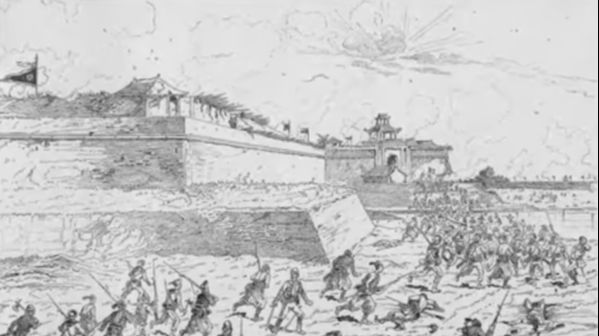Why did the French colonizers not completely overthrow the Nguyen dynasty but instead allow it to exist as a puppet government? This is a question that many people are curious about because if the French were so strong, why didn't they eliminate the Nguyen dynasty altogether and let the Nguyen king sit there, even if just as a puppet, even if just in form? In the 19th century in Europe, the French colonizers were aggressively expanding their colonies. They saw Vietnam as a lucrative bait with its strategic geographical location, fertile land, and especially the economic potential from products such as rice, rubber, coffee, and coal.
In 1858, the French fired the first shot when they attacked Da Nang, marking the beginning of the invasion of Vietnam. They quickly occupied Southern Vietnam and forced the Nguyen dynasty to sign a protectorate treaty, officially placing Vietnam under French protection. But strangely, instead of overthrowing the Nguyen dynasty, the French allowed the Nguyen government to exist with kings like Dong Khanh, Khai Dinh, and later Bao Dai as puppet kings.
Why is that?
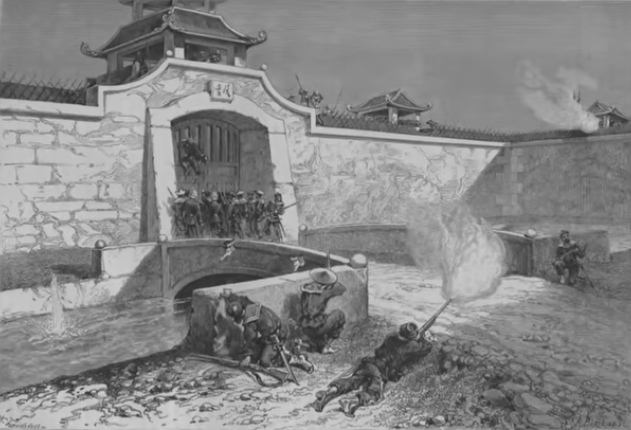
The French colonizers were very clever and calculated when they set foot in Vietnam. They realized that the Vietnamese had a tradition of respecting kings, which was influenced by Confucianism. The Nguyen dynasty, although weakened at that time, still held the symbolic power that the people referred to as the Son of Heaven, the emperor representing the unity of an entire nation. If the French overthrew the Nguyen dynasty immediately, they would face the risk of strong resistance from the people. The Vietnamese, despite their dissatisfaction with the court, still had a certain loyalty to the king. Isn't that why there was the Can Vuong movement?
The elimination of the Nguyen dynasty could spark uprisings that the French did not want to suppress. Instead, the French chose a smarter way, keeping the Nguyen dynasty as a puppet to rule indirectly. They allowed the Nguyen king to sit on the throne, but real power lay in the hands of the French. Kings like Dong Khanh, Khai Dinh, or Bao Dai only played decorative roles, signing decrees according to French wishes, enacting policies drafted by the French. This method helped the French create a legal facade for their rule. The people saw that the king was still there, the court was still there, so they felt less like they had completely lost their country.
Even though the reality was that they had been manipulated by the French. This tactic of the French is called indirect rule, and the French learned from the British experience in India, keeping a local government as a puppet to minimize popular opposition. Another important reason was that the French wanted to save costs and manpower. Just think, to govern a distant country like Vietnam, thousands of kilometers away from Europe in those days, the French had to bring troops, officials, and all sorts of personnel from France. This cost a lot of money and effort.
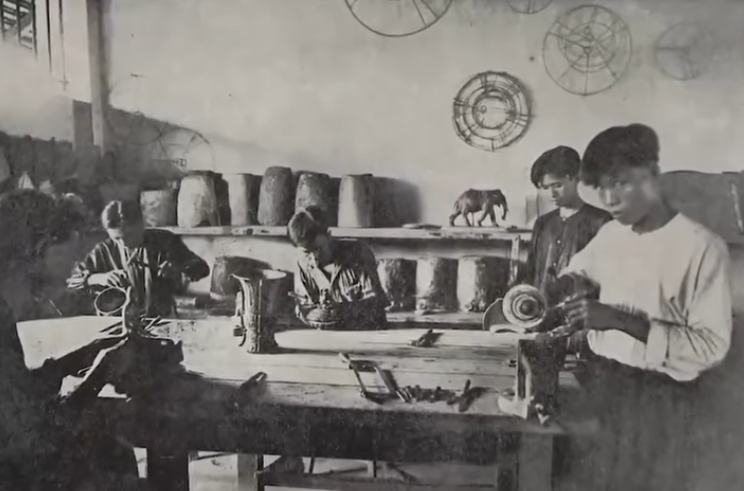
If they overthrew the Nguyen dynasty and ruled directly, they would have to build an administrative apparatus from scratch, appoint French officials everywhere, and face the fact that the people did not understand the language and customs. This would increase the cost of governance and make everything more complicated. Instead, by keeping the Nguyen dynasty as a tool, the French took advantage of the existing bureaucratic system. Vietnamese officials, district chiefs, and even lower-level officials worked under the direction of the French.
The Hue court still maintained the traditional bureaucratic system, collected taxes, managed the people, but everything had to report and obey the orders of the French. This helped the French save a lot of money and manpower because they did not need to send too many people from France, just a few high-ranking officials like governors or resident commissioners were enough to control the entire system. For example, in Southern Vietnam, the French ruled directly, but in Central and Northern Vietnam, they allowed the Nguyen dynasty to self-manage under the supervision of the French. Vietnamese officials still worked as before, but all major decisions had to go through the French.
This management method is like hiring a local manager to work for oneself, which is both cheap and effective. Another reason the French kept the Nguyen dynasty was to prevent uprisings. During this period, although the Nguyen dynasty was weakened, many anti-French movements erupted, such as the Can Vuong movement led by King Ham Nghi or the uprisings of Phan Dinh Phung and Hoang Hoa Tham. If the French overthrew the Nguyen dynasty, they would inadvertently create a power vacuum that would give these movements a reason to explode more strongly. The people might see the overthrow of the king as an act of insult, thereby inciting the resistance movement.
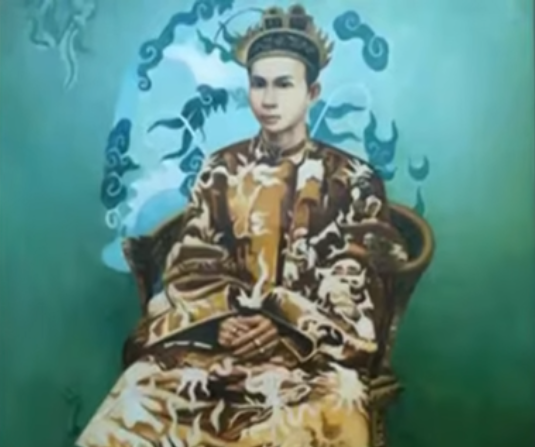
By keeping the Nguyen dynasty, the French created a safe zone to contain the uprisings. They installed pro-French kings like Dong Khanh, Khai Dinh, or Bao Dai to appease the people. These kings were often chosen by the French for their weakness or susceptibility to manipulation. For example, King Dong Khanh was placed on the throne by the French because he was known to be compliant. Meanwhile, kings with a spirit of resistance like Ham Nghi, Thanh Thai, and Duy Tan were deposed or exiled by the French. This approach helped the French control the court while weakening the resistance movements, and these puppet kings suppressed anti-French movements and patriotic movements.
Another interesting point is that the French were very skilled at exploiting the culture and traditions of the Vietnamese to serve their ruling purposes. In Vietnam at that time, Confucian thought was still very strong. The people regarded the king as the Son of Heaven, representing the will of heaven, and the overthrow of the king was unacceptable in the eyes of many. If the French eliminated the Nguyen dynasty, they would be seen as enemies of Vietnamese culture, alienating both the scholar class and the common people. Instead, they allowed the Nguyen dynasty to exist as a cultural symbol. Court rituals, ceremonial activities, and traditional customs were still maintained in Hue. But all were under the control of the French.
For example, the kings still held ceremonies, still wore royal robes, but the real decisions were made by the French. This created a feeling that Vietnamese culture was still respected, even though in reality, the French were manipulating everything. So who were the most pro-French kings? First, we talk about King Dong Khanh, one of the most classic puppet kings. Dong Khanh ascended the throne in an extremely tense context. In 1885, King Ham Nghi, a young king full of patriotism, left the imperial city of Hue and fled to Quang Tri to launch the Can Vuong movement against the French.
The Hue court fell into chaos, and the French needed an obedient person to replace him. They chose Dong Khanh, a brother of Ham Nghi, because he was known to be gentle and easily manipulated. Dong Khanh was someone the French adored. He had no ambition to resist, was willing to listen, and even expressed gratitude to the French for being placed on the throne. Under Dong Khanh, the Hue court almost became a complete tool of the French. All decrees were drafted by the French, from tax collection to suppressing anti-French movements. For the French, Dong Khanh was a perfect choice.
A true puppet king who helped them consolidate power without any trouble. Or later, there was Khai Dinh. Khai Dinh is often seen as the most pro-French king of the Nguyen dynasty, even being directly called a puppet of the French colonizers by many contemporaries. Ascending the throne in a context where the Hue court had almost lost all power, Khai Dinh chose to fully cooperate with the French protectorate government to keep his throne. He supported policies imposed by the French, was willing to sign decrees to increase taxes to fund the construction of extravagant projects like his own tomb, which cost a huge amount and was mocked by the people as a golden tomb.
The fact that King Khai Dinh traveled all the way to France in a suit and praised the civilizing efforts of the French further cemented the image of this puppet king in the eyes of patriotic scholars at that time. Therefore, in modern events, his name is often associated with the decline of the Nguyen dynasty and the almost absolute dependence on the French colonizers. King Bao Dai, the last king of the Nguyen dynasty, was also seen as pro-French. But his path was different from Khai Dinh in that he was initially heavily influenced by the French due to being raised and educated in Paris. However, later there were periods when he changed according to the circumstances. He ascended the throne when he was just over 10 years old, and real power still lay in the hands of the French resident commissioner.
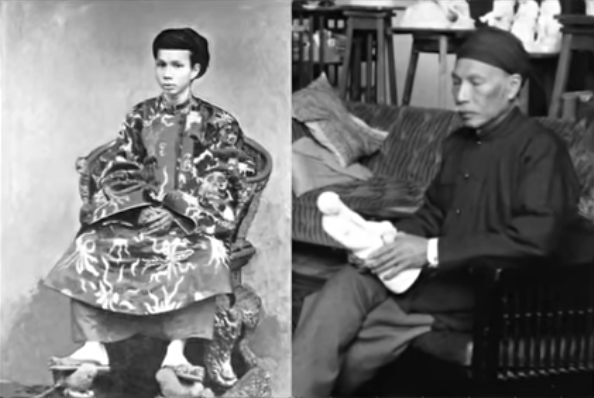
When he grew up and returned to the country, Bao Dai tried to create the image of a modern king, but most of the policies and the court apparatus were still controlled by the French. During World War II, Bao Dai was a puppet under the Japanese government. After the August Revolution, he abdicated and handed over the sword of honor to the Viet Minh, but just a few years later, he accepted to return as the head of the Vietnamese nation in the French Union to confront the patriotic government. This balancing act caused Bao Dai's image in history to be associated with a hedonistic personality, a lack of steadfastness, and he is often remembered more as a playboy king than as an independent leader.
So, was holding the Nguyen dynasty as a puppet successful?
The answer for the French is yes. It helped the French govern Vietnam relatively stably for nearly a century. They exploited resources, collected taxes, and maintained social order without having to expend too much effort. Although the Nguyen dynasty was just a puppet, it helped the French manage Vietnam better and minimize direct conflicts.
